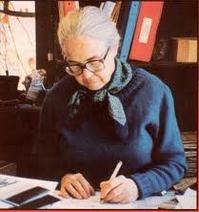"One of the hallmarks of Pope Benedict XVI's papacy has been his emphasis on the need for an authentic encounter with Christ. Monsignor Giussani's principles help us understand just how that can happen."
Father Dwight Lonenecker
"One of the hallmarks of Pope Benedict XVI's papacy has been his emphasis on the need for an authentic encounter with Christ. Monsignor Giussani's principles help us understand just how that can happen."
Father Dwight Lonenecker
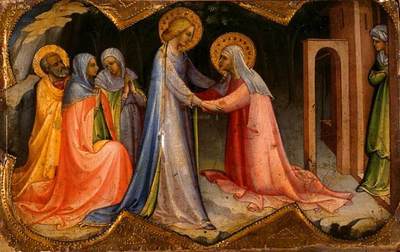
The Word of God is not a literary expression, but is the indication of an event, it is always a fact: the Word of God is Christ. His word starts from the promise of an event. The figure of the Virgin is completely filled with memory, the word of her people, stretching completely toward the meaning of these events (the Angel's announcement, Elizabeth's greeting). This is why Elizabeth used the highest form of address: 'Blessed is she who believed in the fulfillment of the Word of the Lord.'
Monsignor Luigi Giussani
In our continuing reflection on prayer in the letters of Saint Paul, we now consider the Apostle's striking affirmation that Jesus Christ is God's "Yes" to mankind and the fulfillment of all his promises, and that through Jesus we say our "Amen", to the glory of God (cf. 2 Cor 1:19-20). For Paul, prayer is above all God's gift, grounded in his faithful love which was fully revealed in the sending of his Son and the gift of the Holy Spirit. The Spirit, poured forth into our hearts, leads us to the Father, constantly making present God's "Yes" to us in Christ and in turn enabling us to say our ""Yes" - Amen! - to God. Our use of the word "Amen", rooted in the ancient liturgical prayer of Israel and then taken up by the early Church, expresses our firm faith in God's word and our hope in his promises. Through this daily "Yes" which concludes our personal and communal prayer, we echo Jesus' obedience to the Father's will and, through the gift of the Spirit, are enabled to live a new and transformed life in union with the Lord.
Pope Benedict XVI
30 May 2012

We invite you to see For Greater Glory in theaters June 1st.
For theater listings please visit www.forgreaterglory.com today!
I am slowly reading a book written by Dom Michael Casey, a Cistercian monk from the Abbey of Tarrawara (Australia), The Road to Eternal Life, a series of reflections on the Prologue of the Rue of St Benedict. With all the talk of being a good witness and yesterday's emphasis on our destiny in Christ, I thought Dom Michael's reflection on boasting in the Lord makes some sense for us today. I recommend the book.
"And again he says, 'Let the one who boasts, boast in the Lord'." (2 Cor 10:17 quoted in the Rule of St Benedict, Prologue v. 32)
The one in the New Testament who speaks most about boastfulness is Saint Paul. He sees boasting as an expression of an autonomy that weakens a person's total reliance on God-that is, it weakens faith. Those who think that religion is simply a matter of conforming to the precepts of the law, or perhaps so twisting the precepts of the law so that they are comfortable, have not yet learned the art of putting their trust in God, relying on God's mercy. They are locked into the schemes of self-perfection that they themselves have crafted. The end of such self-assurance can be only disaster. As Saint Ignatius of Antioch wrote to Polycarp, "The one who boasts has already come to nothing".
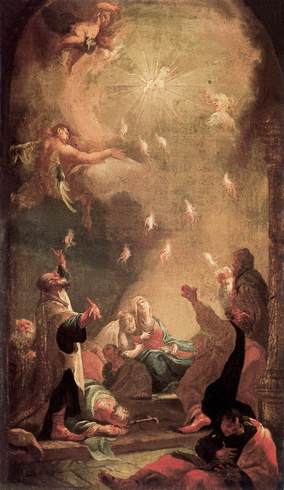 Heavenly King,
Heavenly King,Reminding us that the Holy Spirit "continues to inspire women and men who engage in the pursuit of truth" Pope Benedict announced that on October 7, at the beginning of the Ordinary Assembly of the Synod of Bishops, he would proclaim St. John of Avila and St. Hildegard of Bingen as Doctors of the Church. "These two great witnesses of the faith lived in very different historical periods and came from different cultural backgrounds," he said. "But the sanctity of life and depth of teaching makes them perpetually present: the grace of the Holy Spirit, in fact, projected them into that experience of penetrating understanding of divine revelation and intelligent dialogue with the world that constitutes the horizon of permanent life and action of the Church."
The Pope continued: "Especially in light of the project of the New Evangelization, to which the Assembly of the Synod of Bishops will be dedicated, and on the vigil of the Year of Faith, these two figures of saints and doctors are of considerable importance and relevance."
I am happy to celebrate this Holy Mass with you - a Mass animated by the Choir of the Academy of Santa Cecilia and by the Youth Orchestra, which I thank - on this Feast of Pentecost. This mystery constitutes the baptism of the Church, it is an event that gave the Church the initial shape and thrust of its mission, so to speak. This shape and thrust are always valid, always timely, and they are renewed through the actions of the liturgy, especially.
This morning I want to reflect on an essential aspect of the mystery of Pentecost, which maintains all its importance in our own day as well. Pentecost is the feast of human unity, understanding and sharing. We can all see how in our world, despite us being closer to one another through developments in communications, with geographical distances seeming to disappear - understanding and sharing among people is often superficial and difficult. There are imbalances that frequently lead to conflicts; dialogue between generations is hard and differences sometimes prevail; we witness daily events where people appear to be growing more aggressive and belligerent; understanding one another takes too much effort and people prefer to remain inside their own sphere, cultivating their own interests. In this situation, can we really discover and experience the unity we so need?
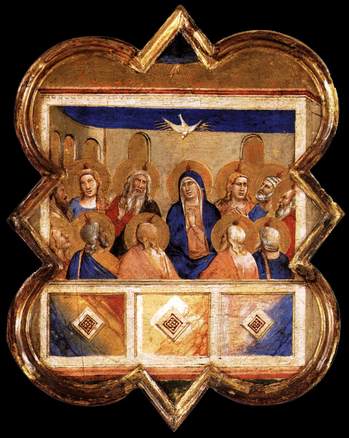 A blessed Pentecost!
A blessed Pentecost!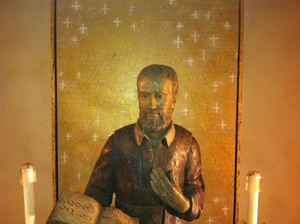
Father, you continually raise up your faithful to the glory of holiness. In your love kindle in us the fire of the Holy Spirit who so filled the heart of Philip Neri.
In so many ways Saint Philip Neri is a saint, a witness to the work of the Holy Spirit in this world. This fact is borne in the activity of his life for the salvation of souls. He was a close friend of the Benedictines, Dominicans, and the Jesuits. A well-sought after confessor and preacher, he drew the keen attention of Popes, bishops and saints. Who can't relate to a man who had a keen sense of humor, a love for all people, especially the youth, and a miracle-worker. The Church has named Saint Philip one of the patrons of Rome.
My love for Philip Neri leads me to hope that Connecticut, preferably New Haven, will see an Oratory in the future.
Among other things today, I watched the 2010 film "Saint Philip Neri: I Prefer Heaven," with Gigi Proietti, Adriano Braidotti, Francesco Salvi, and Roberto Citran. The director is the wonderful Giacomo Campiotti whom I met last fall in NYC while he was stateside promoting another film of his.
A brief biography of Saint Philip Neri.
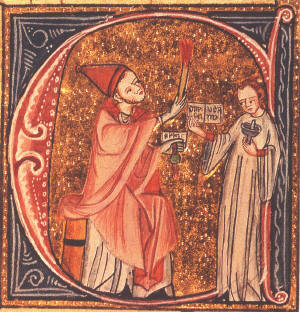 The figures of the medieval period in church history
is not high on many today. Issues of ecclesial reform and religious liberty
during the 11th century are resonant today. Liturgically the Church recalls one
of the popes who worked for reform and religious freedom: Pope Saint Gregory
VII. The Tuscan pope was born between 1020 and 1025 and bore the name of
Hildebrand. Reliable facts of his Hildebrand's life are obscure but we know his
uncle Laurentius was abbot of a Roman monastery, where he engaged his
education. Monasteries were great centers of education and culture.
The figures of the medieval period in church history
is not high on many today. Issues of ecclesial reform and religious liberty
during the 11th century are resonant today. Liturgically the Church recalls one
of the popes who worked for reform and religious freedom: Pope Saint Gregory
VII. The Tuscan pope was born between 1020 and 1025 and bore the name of
Hildebrand. Reliable facts of his Hildebrand's life are obscure but we know his
uncle Laurentius was abbot of a Roman monastery, where he engaged his
education. Monasteries were great centers of education and culture.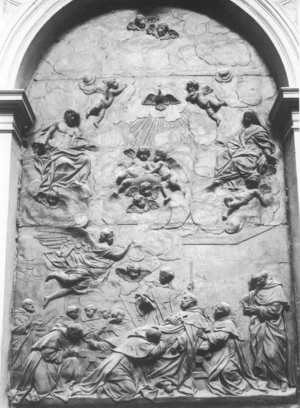 O Light of the Church, teacher of truth, rose of patience, ivory of chastity; you freely pour forth the waters of wisdom, preacher of grace, unite us with the blessed.
O Light of the Church, teacher of truth, rose of patience, ivory of chastity; you freely pour forth the waters of wisdom, preacher of grace, unite us with the blessed. 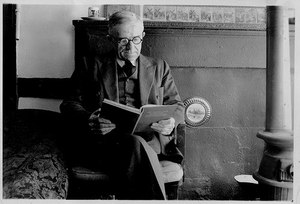 Catholics who don't know the names of Peter Maurin (1877-1949) and Dorothy Day (1897-1980) ought to do some research. These two, I am becoming more convinced, are true holy people that we can reliably follow. That is, they will lead us to Christ. But don't be fooled: neither are easily understood given what we face today, nor are they lukewarm about the Catholic faith they wholeheartedly embraced and lived.
Catholics who don't know the names of Peter Maurin (1877-1949) and Dorothy Day (1897-1980) ought to do some research. These two, I am becoming more convinced, are true holy people that we can reliably follow. That is, they will lead us to Christ. But don't be fooled: neither are easily understood given what we face today, nor are they lukewarm about the Catholic faith they wholeheartedly embraced and lived.Last week Benedict XVI spoke to people who belong to various movements in the Church that make contributions to work, culture and education. Why is my posting this important? Because I believe what the Pope has to say is crucial in following his lead in the life I lead, and I believe it is helpful for others who desire to live similarly. I am confronted --in a good way-- with questions about the value of work, culture and education and the place of the Church in these sectors. As Father Giussani told us, the Church is not here to fix our problems but to offer us a lens by which we can judge the reality in front of us so that we can fix a problem. Pay close attention to what Benedict has to say:
''Work is not only an instrument of individual profit, but it is a moment in which to express ones' own skills with a spirit of service in a professional activity, be it factory work, agricultural, scientific or otherwise,"
"Culture, voluntary service and work constitute the indivisible trinomial of the Catholic laity's daily life, which makes belonging to Christ and the Church more real, in the private as much as in the public spheres of society."
"The lay faithful put themselves in the game when they touch one or more of these contexts and, in the cultural service, by showing solidarity with those in need and on the job, they strive to promote human dignity."
At Monday's lunch with many of the cardinals --not all--Pope Benedict XVI spoke of the struggle he and they are engaged together: for good against evil. Not exactly a lite topic for discussion for a lunch celebrating one's 85th birthday and 7th anniversary of election to the Chair of Saint Peter, but a point that is true and needs to be addressed.
In reading his text (below) you will notice the Pope's use of the concept ecclesia militans - the Church Militant - which he admits is "old fashion" but still fitting today. When we say "the Church Militant" it means all living Christians who struggle against sin, the devil, or as the Apostle Paul says "..the rulers of the darkness of this world" and "spiritual wickedness in high places" (Ephesians 6:12).
"Church Militant" has two other sisters, "Church Triumphant" and "Church Suffering" that give context to Christian life in light of the doctrine of the Communion of Saints and of what we know the Church to be.
The quick definition of the "Church Triumphant" (Ecclesia Triumphans), indicates those who live in the beatific vision, they see and are seen by God; we say these people are in heaven. The feast day for those in heaven is November 1, All Saints Day. When we speak of the "Church Suffering" (also called the Church Penitent, Ecclesia Penitens; or Church Expectant, Ecclesia Expectans), we believe that this group of believers are the souls in purgatory. The feast day is All Souls, November 2.
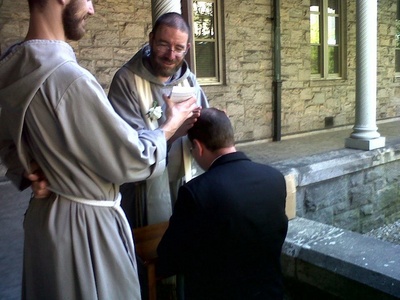
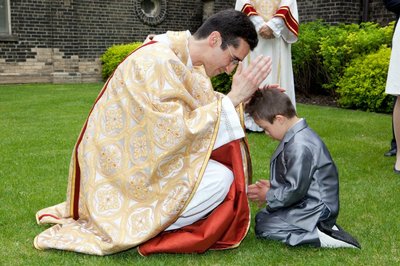 The late spring months have a few notable celebrations: the continuation of the Easter Mysteries like the Ascension and Pentecost, Corpus Christi, Mother's and Father's Day, and priesthood celebrations. Nothing moves the heart spiritually, that is, than witnessing the blessing of a newly ordained priest. Here a newly ordained priest of Toronto bestows God's blessing on a little one...
The late spring months have a few notable celebrations: the continuation of the Easter Mysteries like the Ascension and Pentecost, Corpus Christi, Mother's and Father's Day, and priesthood celebrations. Nothing moves the heart spiritually, that is, than witnessing the blessing of a newly ordained priest. Here a newly ordained priest of Toronto bestows God's blessing on a little one...God's providence means that wherever we have got to, whatever we have done, that is precisely where the road to heaven begins. However many clues we have missed, however many wrong turnings we have taken, however unnecessarily we may have complicated our journey, the road still beckons, and the Lord still 'waits to be gracious' to us.
Father Simon Tugwell, OP
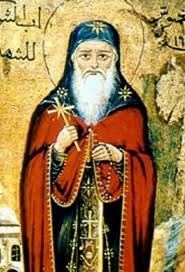 The Church gives us Saint Pachomius (+346), the Egyptian monk and abbot famous for being the "founder" of community-focussed monasticism (cenobitic) thus offering an new pattern of following Christ as a monk that up until Pachomius, one did alone. 200 years later Saint Benedict brought this version of monastic life in general acceptance in the west, drawing on what this sainted abbot first done. He's known, too, for his writings titled "Koinonia" (in Latin, Communio). He wrote:
The Church gives us Saint Pachomius (+346), the Egyptian monk and abbot famous for being the "founder" of community-focussed monasticism (cenobitic) thus offering an new pattern of following Christ as a monk that up until Pachomius, one did alone. 200 years later Saint Benedict brought this version of monastic life in general acceptance in the west, drawing on what this sainted abbot first done. He's known, too, for his writings titled "Koinonia" (in Latin, Communio). He wrote: "Brothers, as long as you have breath in your bodies, strive for your salvation. Before the hour comes in which we shall weep for ourselves, let us practice virtue eagerly."
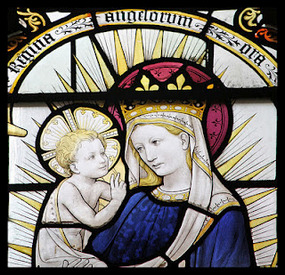
"The Church welcomes with joy and compassion the mothers who, recognizing that all life is a gift from God, come to the Church seeking a blessing for their unborn child. Such a blessing sustains the parents by imparting grace and comfort in time of concern and need, unites the parish in prayer for the unborn child, and fosters respect for human life within society."
Here's the key prayer:
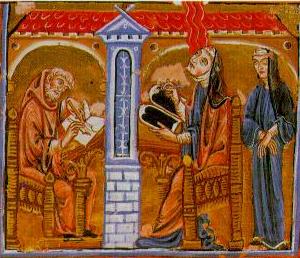
Saint Hildegard of Bingen is getting some press these days. Many are very curious to know how and why the Pope did such an unusual thing in making her cult as concrete as possible. Being inscribed as a saint in the album of the saints is pretty concrete, I'd say.
The Church's official teaching is seen by the use of concepts like "extension of Hildegard of Bingne's cult to the entire Church," meaning that she is proposed as a model of holiness with moral certainty to the faithful. Remember, only the Blessed Trinity is worshiped at the Liturgy. Saints and Blesseds are venerated, honored. Not the same. Hence, the definition of "cult" in Catholic theology is that the veneration saints particularly at the sacred Liturgy (i.e., the worship of God at Holy Mass, Lauds and Vespers) is made possible by the Church recognizing that this person is with God in heaven and is a reliable witness for Christian living.
We are fast approaching the great feast of the Pentecost, the outpouring of the Holy Spirit upon those who follow Christ. This feast, like all others we observe in the liturgical life of the Church, is not about an event of 2000+ years ago but an experience of great proportions evidenced today. Yes, we remember liturgically the first event (anamnesis) but it is a remembrance that spills into today's context. Attentive to our sacred Liturgy, we see that one piece of Scripture interprets another, one liturgical observance of Sunday (or daily) sheds light on another. Pentecost is coming in two weeks and last Sunday the Church gave us a foreshadowing of a future gift. Below is an excerpt of a homily delivered by an American Benedictine monk in Italy giving us "taste" of what's coming. These paragraphs are presented for our lectio.
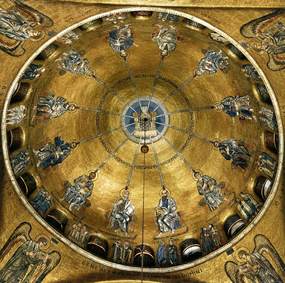
The departure of Jesus in terms of his bodily presence, therefore, is not a reason to be sad; instead, it is a cause of great joy. And this is exactly what the Lord promises when he says: "I tell you the truth; it is to your advantage that I go away, for if I do not go away, the Counselor will not come to you; but if I go, I will send him to you" (Jn 16:7).
Christ sends us the Counselor, that is the Holy Spirit, in union with his Father. In fact, the Holy Spirit is the special promise of the Father (cf. Acts 2:33; Eph 1:13; Lk 24:49), the gift which allows us to know him more intimately, "for the Spirit searches everything, even the depths of God" (1 Cor 2:10). The good fathers of this world show their goodness towards their children giving them the most precious gift, that of personal love. The Lord says to earthly fathers: "If you then, who are evil, know how to give good gifts to your children, how much more will the heavenly Father give the Holy Spirit to those who ask him!" (Lk 11:13). Given that "every good gift and every perfect gift is from above, coming down from the Father of lights" (Jas 1:17), as we heard in today's epistle [May 9, 2012], it is clear that the best gift that the Father can bestow is that of his Holy Spirit, through whom the Father and the Son are able to dwell in us (cf. Jn 14:23).
How eager, therefore, should we be to receive this Spirit! O how we should implore the Father for this perfect gift! We should say, therefore: Come, Holy Spirit! Fill the hearts of thy faithful and kindle in them the fire of your love. Send forth thy Spirit and they shall be created, and you shall renew the face of the earth. Amen.
Father Basil Nixen, OSB
9 May 2012
Monastery of Saint Benedict
Norcia, Italy
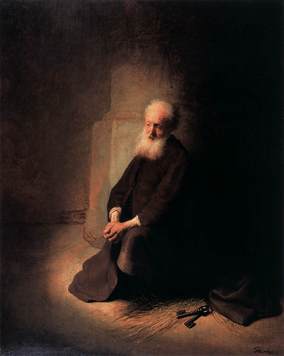
In our catechesis on Christian prayer, we now consider Saint Peter's miraculous liberation from imprisonment on the eve of his trial in Jerusalem. Saint Luke tells us that as "the Church prayed fervently to God for him" (Acts 12:5), Peter was led forth from the prison by an Angel of light. The account of Peter's rescue recalls both Israel's hasty exodus from bondage in Egypt and the glory of Christ's resurrection. Peter was sleeping, a sign of his surrender to the Lord and his trust in the prayers of the Christian community. The fulfillment of this prayer is accompanied by immense joy, as Peter rejoins the community and bears witness to the Risen Lord's saving power. Peter's liberation reminds us that, especially at moments of trial, our perseverance in prayer, and the prayerful solidarity of all our brothers and sisters in Christ, sustains us in faith. As Peter's Successor, I thank all of you for the support of your prayers and I pray that, united in constant prayer, we will all draw ever closer to the Lord and to one another.
Pope Benedict XVI10 May 2012
Do we have perseverance in prayer?What really sustains our prayer?
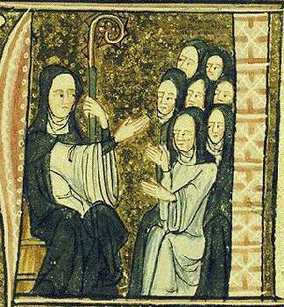
This morning the Holy Father had received in a private audience Angelo Cardinal Amato, SDB, Prefect of the Congregation of the Causes of Saints, who presented the cases for sainthood that his office has been working on.
Among the many important things decided, the Pope has given us the liturgical memorial of and inscribed in the catalog of Saints of the Universal Church, the model of holiness in the person of Saint Hildegard of Bingen, a German Benedictine nun born in Bermershein in 1089 and who died in Rupertsberg on 17 Septemeber 1179.
What is interesting here is that Hildegard never really went through the same process of canonization that's done nowadays so you can say the Church is recognizing her sanctity and place with God without the rigorous investigation that is being done for the Venerable Servant of God Michael J. McGivney. In part, this is because through the centuries the Church has changed several times, the process by which it is judged a person is a blessed or saint. Previously, people used the title "saint" with Hildegard as "popular theology and cult of the saints."
So, with this ecclesial recognition Saint Hildegard of Bingen may be honored officially as a saint of the Church. She may be considered the Church's newest Benedictine saint.
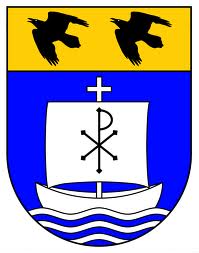 The monks of Saint Meinrad Archabbey are gaining traction in the use of social media to promote prayer, the monastic life and ecclesial service.
The monks of Saint Meinrad Archabbey are gaining traction in the use of social media to promote prayer, the monastic life and ecclesial service.The daily grind of living is only made more fruitful when we take time to use the gifts of the Holy Spirit. While not technically not one of the Seven Gifts of the Holy Spirit, Prudence (a cardinal virtue) is perfected by the Spirit's energy. How often do we move through our day without giving time to self-awareness, reflection on our "I" in action? The lack of a Trinity-diven examination of conscience in one's spiritual life is a pitfall many post-moderns fall into. Any person wanting to know more about him or herself needs to spend time, if only 10 minutes a day, in reviewing points of grace and sin in life up to that point of the day while asking for the grace of root-and-branch conversion. For example, it is has been said that a measure of the person today is how he or she uses free time. Discretion is a fruit of the virtue of prudence; ask yourself if you have been sufficiently discrete in your undertakings.
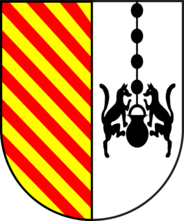
Spiritual infirmities such as tepidity are caused, not only by chills but also by fevers, that is, by excessive zeal. Saint Paul says, let your service be a reasonable service [Rom. 12:1], because he knew the truth of the words of the Psalmist, the king in his might loves justice [99:4], that is, discretion; and what was prefigured in Leviticus, whatsoever sacrifice you offer, you shall season it with salt [2:13]. In the same vein does Saint Bernard speak: the enemy has no more successful ruse for depriving the heart of real charity than to get him to act rashly and not in keeping with spiritual reasonableness. "Nothing in excess," said the philosopher. And this principle should be our guide even in a matter pertaining to justice itself, as we read in Ecclesiastes, be not over just [7:16]. If one fails to observe this moderation, he will find that good is turned into evil and virtue into vice. He will also learn that many inconveniences follow which are quite contrary to the purpose of the one who so acts.
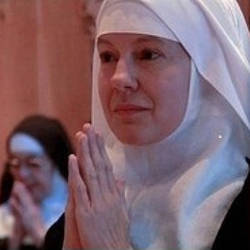 One of the US's monasteries of Benedictine nuns is getting a lot media attention lately. Regina Laudis Abbey (Bethlehem, CT) is now recognized by the European Catholic press for a story written by Mauro Pianta for the Vatican Insider, "U.S.: Cameron's former lover becomes cloistered nun." Mr. Pianta tells of the UK's Prime Minister David Cameron's former very beautiful girlfriend who found her vocation in the American abbey after a conversion in her life. Sister John Mary known in history as Laura Adshead left the world to follow Christ. Let's note, however, Sister John Mary has been at the Abbey for four years, now. So this story is not exactly new, but it is good to know that smart women still follow the Lord's call.
One of the US's monasteries of Benedictine nuns is getting a lot media attention lately. Regina Laudis Abbey (Bethlehem, CT) is now recognized by the European Catholic press for a story written by Mauro Pianta for the Vatican Insider, "U.S.: Cameron's former lover becomes cloistered nun." Mr. Pianta tells of the UK's Prime Minister David Cameron's former very beautiful girlfriend who found her vocation in the American abbey after a conversion in her life. Sister John Mary known in history as Laura Adshead left the world to follow Christ. Let's note, however, Sister John Mary has been at the Abbey for four years, now. So this story is not exactly new, but it is good to know that smart women still follow the Lord's call.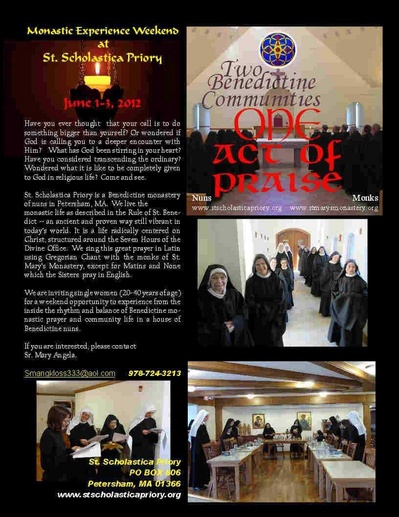
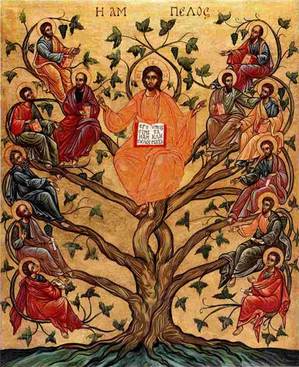
Saint John's gospel uses the agricultural image of vine and a vine dresser to express a relationship that is unique. Quite singular when you think that neither the Jews nor the Muslims would admit in terms of intimacy between the Creator and creature, Father and Son, God and me. So, why is Christ called the 'true vine' and why are we his 'branches'? The short answer is because it is our Christian belief, our Christology, that God is waiting for humanity to bear fruit, sin notwithstanding. The Incarnation, and the proclamation of the Good News tells us of the wine of love, obedience and prayer with the goal of uniting God and humanity in a truer way.
That we are expected to "bear much fruit" and to rely on the Lord for all things there is a hope that we remain in Him and that His "words remain in you". There is a dependence on God in a radical manner that is unheard of in most of relationships. To remain, to abide, to stay close to Jesus is the key of the spiritual life. Not to remain in Christ is reject the offer of Grace. The question of what it means to remain in Christ is given by the second reading: keep the commandments, of both Testaments of sacred Scripture and the teaching of the Church. Concretely, we are nourished by Christ Himself in the sacraments of the Church, notably in the Holy Eucharist.
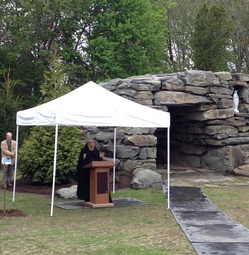
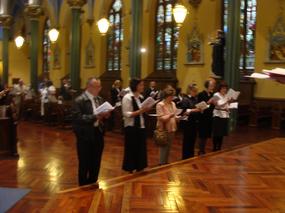 Many of the religious orders have what is called a Third Order Laity, or some such name for the laity who are closely connected spiritually and morally to an Order and continue to live their lives according to the vocation they've been given: the single life, married life or secular priesthood.
Many of the religious orders have what is called a Third Order Laity, or some such name for the laity who are closely connected spiritually and morally to an Order and continue to live their lives according to the vocation they've been given: the single life, married life or secular priesthood.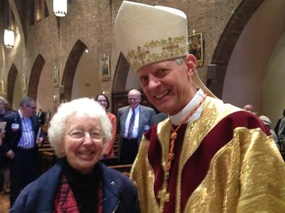 As I mentioned on Monday, we celebrated the feast of Saint Catherine of Siena at the New York City parish under her patronage with a solemn Mass offered by His Eminence, Donald Cardinal Wuerl, STD, archbishop of Washington. The Saint Catherine of Siena Award was bestowed on the Cardinal honoring him for his lifetime work for Catholic health care as was Sister Elaine Goodell, PBVM, for her 27 years as a Catholic chaplain at Memorial Sloan-Kettering Hospital. It is noteworthy that Sister Elaine began her ministry as a hospital chaplain at the age of 60 following a sabbatical from teaching music. This liturgical and professional observance was the Sixth Annual ceremony established by the Dominican Friars Healthcare Ministry of New York.
As I mentioned on Monday, we celebrated the feast of Saint Catherine of Siena at the New York City parish under her patronage with a solemn Mass offered by His Eminence, Donald Cardinal Wuerl, STD, archbishop of Washington. The Saint Catherine of Siena Award was bestowed on the Cardinal honoring him for his lifetime work for Catholic health care as was Sister Elaine Goodell, PBVM, for her 27 years as a Catholic chaplain at Memorial Sloan-Kettering Hospital. It is noteworthy that Sister Elaine began her ministry as a hospital chaplain at the age of 60 following a sabbatical from teaching music. This liturgical and professional observance was the Sixth Annual ceremony established by the Dominican Friars Healthcare Ministry of New York.In these days following the feast of Saint Catherine of Siena, I thought I would post this rather beautiful extract from one of the saint's Dialogues. It shows the depth of love that Catherine knew she had with her Savior, her lover.

"O eternal, infinite Good! O mad lover! And you have need of your creature? It seems so to me, for you act as if you could not live without her, in spite of the fact that you are Life itself, and everything has life from you and nothing can have life without you. Why then are you so mad? Because you have fallen in love with what you have made! You are pleased and delighted over her within yourself, as if you were drunk with desire for her salvation. She runs away from you and you go looking for her. She strays and you draw closer to her. You clothed yourself in our humanity, and nearer than that you could not have come."
Catherine of Siena, The Dialogue, tr. Suzanne Noffke (New York: Paulist Press 1980) 325.
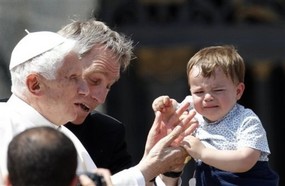
We join with the Pope, Benedict XVI, in prayer before the Divine Majesty for the following intentions:
The general intention
That initiatives which defend and uphold the role of the family may be promoted within society.
The missionary intention
That Mary, Queen of the World and Star of Evangelization, may accompany all missionaries in proclaiming her Son Jesus.
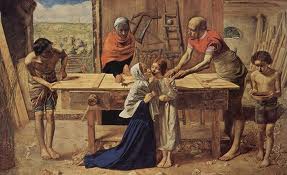
Work is often treated as a four letter word; something to be avoided. Understanding what the value of work is today is rather complex due to the ideology we've been subjected to since at least the 19th century as a result of industrialism, Communism and Socialism.
One of the many beautiful things John Paul II wrote about is the human person and how the person is meant to thrive, not just exist. His ideas about what and who the person is understood in what he taught about subjectivity, meaning that there is "the ground on which the dynamic relation, or rather inter-relation, between the person and the action is actualized. The failure to recognize man´s subjectivity would deprive us of the level on which can be grasped all the aspects of this interrelation."
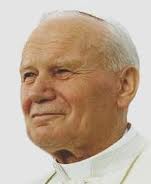 Today marks the first anniversary of the historic beatification of the iconic pope, John Paul II.
Today marks the first anniversary of the historic beatification of the iconic pope, John Paul II.